THE IRISHMAN: An Exercise In Master Filmmaking
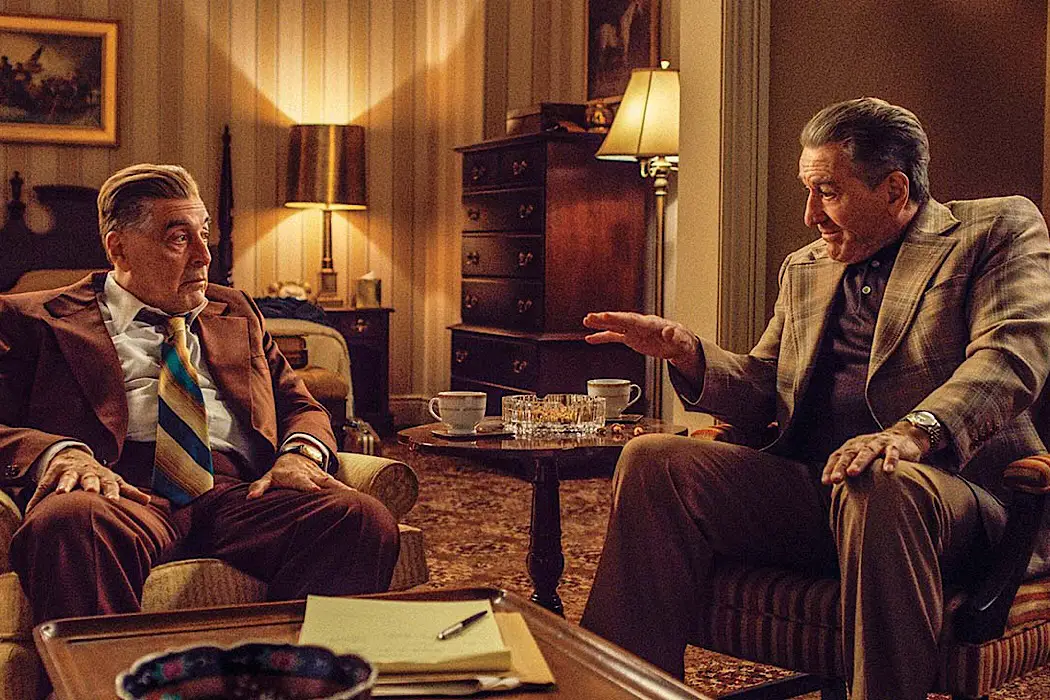
Kristy Strouse is the Owner/Editor in Chief of Film Inquiry,…
There’s something immediate when you put on a Martin Scorsese film: a recognition of his specific style, his brand of genius. Yet, with his newest, The Irishman, there’s also a sense of refinery. While it is still innately “Scorsese” in every functional way, it’s as if the talented filmmaker has grown even more confident in his craft. As I’m sure everyone reading this review knows, it’s nearly three and a half hours, but that doesn’t temper the exquisite work by everyone involved, and if you invest, it breezes by.
The story follows Frank Sheeran (Robert De Niro), and Scorsese revisits the narration used in several of his films, but this isn’t Goodfellas. There are shades of the director’s previous work, across the board, but The Irishman is like an amalgamation after decades behind the lens. His story begins as a much older man, in a nursing home, baring his tale to us like a confession.
An Aging Crime Saga
We see Frank in several moments in his life, various years and locations. From his early days as a truck driver (and occasional thief) to his introduction into organized crime. This starts after an unexpected meet with Russell Bufalino (Joe Pesci). From there he becomes a significant player, as a hitman for the mob, “a man who paints houses.” Soon he meets union boss Jimmy Hoffa (Al Pacino), who he begins to work for, and becomes very close to.
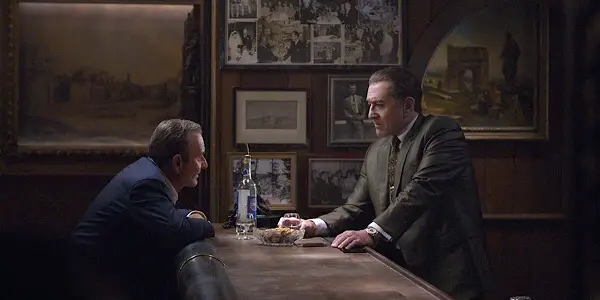
In the beginning of the story we see Sheeran, Bufalino and their wives taking a trip. We’re given descriptors about the characters and that they’re headed to a wedding, but you know it’s in the future and that there is more to it. This sensation doesn’t leave you as the movie progresses, and there’s an understanding that this road trip is going to cease eventually, but to what end? The curiosity and pay off are worth it, and I purposely avoided a lot of information about this story and film. I would recommend the same to anyone who hasn’t seen it.
The screenplay by Steven Zaillian doesn’t waste a minute of dialogue, capturing moments of remorse, manipulation, and genuine friendships/families built within the words uttered. As impressive as the script is, it wouldn’t be as powerful without the performances, and everyone is incredible. Al Pacino, who is every bit as enthusiastic as we know he can be, is perfectly cast as Jimmy Hoffa. He’s stubborn, a hot head, who surprises with moments of real empathy. He’s impeccably matched with De Niro’s austere, more subtle demeanor and the two share a plethora of engaging and hilarious scenes.
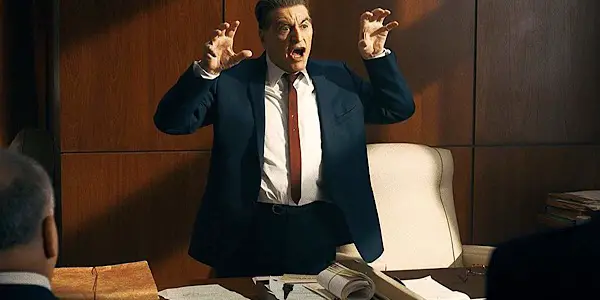
Joe Pesci is sneakingly insidious. He doesn’t hide who he is or the fact that he’s behind many significant and cold endeavors (including one at the end that is especially chilling) but he isn’t the flashy, impulsive characters we’ve seen before. His performance is more gradual, but no less effective. Robert De Niro is the soul of the film, and we truly feel his weathering by its close. Yes, Sheeran may be an unreliable narrator, but here, his sorrow is built and etched into every frame.
The Familiar And The Unfamiliar
The de-aging, which was discussed a lot when the trailer first came out, while noticeable, doesn’t detract. I’d be remiss if I didn’t mention the always on the nose musical choices that Scorsese is known for (among other things) but also his impeccable use of comedy here. There’s a lot of snappy dialogue, and I feel like the director has really embraced his usage of humor. It has always been there, but with The Irishman it’s matured into something natural and on par with the dramatics. Some of my favorite moments of the film aren’t huge – plot pushing sequences, but conversations between Pacino and De Niro.
Throughout the film we meet a lot of real-life individuals, often each paired with a quick description of their real deaths. A constant reminder that while this is fictionalized, based on Sheeran’s own account and various other researches, this kind of power… exists. And what an empire it is.
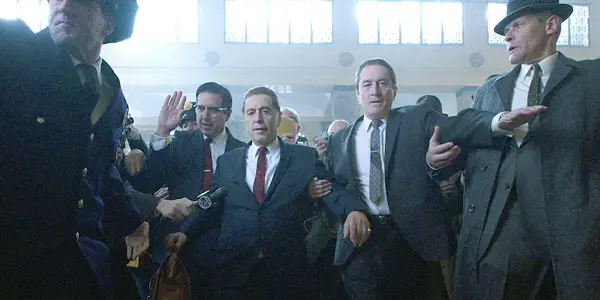
With such a large pool of supporting actors, many of whom have been plucked from previous Scorsese films, or other gangster fair (including Boardwalk Empire and The Sopranos) there’s no shortage of talent on screen. He’s no stranger to this genre and while he has explored organized crime before there’s something unique present here, underscored by a sadness that reverberates throughout the entirety of the long film. A lot has been said about the length, but it’s hardly noticeable. Once it digs in, giving us the players, you’re hooked. The tedious nature of the story, rather than a constant bustle of violence (and there’s plenty of blunt moments of it) or hysteria, relies more on the suspense and degradation of these fleshed characters. An intelligent and rewarding decision.
Frank’s relationship with his family, specifically his daughter Peggy (later played by Anna Paquin) is one of the highlights of the film because it breaks down the barriers. The ones that exist in some crime stories, as if there are no bystanders, no one unscathed in this lifestyle. Their fractured bond continues to wear on Frank until the closing credits.
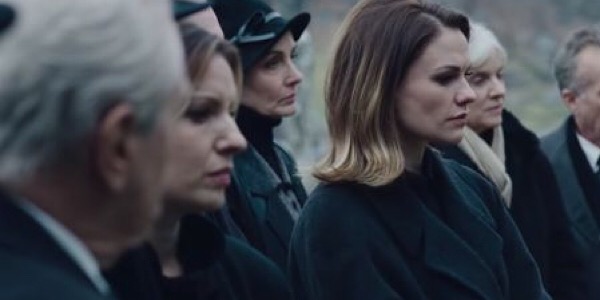
While Paquin doesn’t have many lines, her silence is resounding. A lot occurs within this man’s life, and over the course of the film we see the wear and (quite literally, as he ages) but also the emotional tear. It’s not glamorized, and it is certainly not a happy story, but it is a riveting one.
Conclusion: The Irishman
Many say this is Scorsese’s masterpiece, and while I have some that still remain my favorites, I can’t argue the point. There are decisions made here that show him at his finest, most methodical, and I love it. It allows the details to be discovered, appreciating small nuances for each character, for conversations to be languished and digested, and the relationships to be entirely developed. It takes its time, such as the slow ticking of life, without avoiding the immeasurable weight of this story. That’s the key, because, by the end of this story, as we hear the finality of Frank’s declaration, it’s inescapable what he is feeling.
This is a long buildup of character formation, motive and inevitably, regret. There are consequences to the decisions made in this life, and The Irishman is impeccably innovative, bolstered by the droves of talent involved.
What did you think? How does this rank among Martin Scorsese’s other films? Let us know in the comments below!
The Irishman is currently streaming on Netflix.
Does content like this matter to you?
Become a Member and support film journalism. Unlock access to all of Film Inquiry`s great articles. Join a community of like-minded readers who are passionate about cinema - get access to our private members Network, give back to independent filmmakers, and more.
Kristy Strouse is the Owner/Editor in Chief of Film Inquiry, writer, podcaster, and all around film and TV fanatic. She's also VP of Genomic Operations at Katch Data and is a member of The Online Association of Female Film Critics and The Hollywood Creative Alliance. She also has a horror website: Wonderfully Weird & Horrifying.













